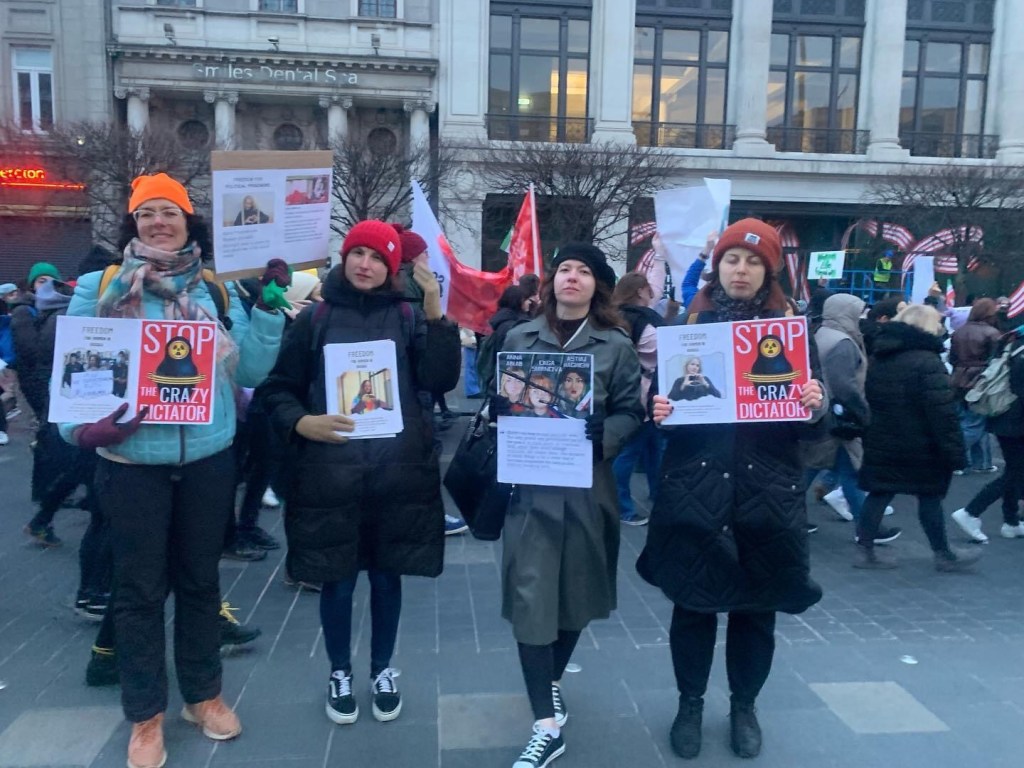Archive for the ‘March 8 International Women’s Day’ Category
The March 8 2024 Referendums in Ireland – A few final thoughts – Vote Yes/Yes
A few final thoughts.
An Irish Times letter-writer offers good advice :
“The arguments made against the proposed constitutional amendments are akin to the owner of a 30-year-old banger, which keeps breaking down, refusing a 10-year-old car as a replacement because they were really hoping for a brand-new model.
When the perfect choice is not on offer, reasonable people take the best option available.
Vote Yes on March 8th to consign a few antiquated bangers to the scrapheap, where they belong. – Yours, etc,
JOHN THOMPSON,
Dublin 7.”
A number of left wing activists calling for a No vote in the Care Referendum are making a classic ultra-left mistake. They are not guided by a concrete analysis of the question on the ballot paper. As a result they advocate keeping reactionary, sexist, and partitionist wording in the Irish Constitution.
Read the rest of this entry »According to Ireland’s constitution, a woman’s duties are in the home – but a referendum could be about to change its sexist wording
Eamon DeValera’s 1937 Irish Constitution contains symbolic sexist wording – the “woman in the home” clause. Laura Cahillane explains why almost everyone on the Irish and feminist left is advocating a Yes vote.
Laura Cahillane, University of Limerick
On March 8 – International Women’s Day – Irish citizens will vote in a referendum on whether or not to replace the so-called “woman in the home” clause in the Irish constitution.
This clause, which dates from 1937, specifies that: “The State recognises that by her life within the home, woman gives to the State a support without which the common good cannot be achieved.” It goes on to say that: “The State shall, therefore, endeavour to ensure that mothers shall not be obliged by economic necessity to engage in labour to the neglect of their duties in the home.”
Originally, the purpose of the provision was to acknowledge the importance of care in the home, which was then provided almost exclusively by mothers. The purpose was to ensure that mothers could remain in the home and would not be forced to work due to financial reasons.
However, the state help implied by the wording was never actually put into practice – women were never supported to provide care in the home. Worse, the constitution was often used to bolster arguments that a woman’s place was in the home and that policies which excluded women from work were acceptable.
Now, as part of a double referendum, Irish citizens will have the chance to change the constitution to a more gender-neutral wording. This is alongside another vote on whether to change the constitution’s definition of “family” to expand it beyond marriage.
Read the rest of this entry »This International Women’s Day, Iranian Feminists Are at the Front Lines
There is much that the global feminist movement can learn from the current women’s struggle in Iran and their vision.
About the author, Frieda Afary :
Frieda Afary is an Iranian American public librarian, translator, writer, activist and author of Socialist Feminism: A New Approach (Pluto Press, 2022). She is also the producer of Iranian Progressives in Translation and socialistfeminism.org. Article Souce : https://truthout.org/articles/this-international-womens-day-iranian-feminists-are-at-the-front-lines/
Frieda Afary is an active supporter of the European Network for Solidarity with Ukraine (ENSU). https://ukraine-solidarity.eu/feminist-news-and-analysis
On International Women’s Day, the world is at a turning point. On the one hand, we are facing the global rise of authoritarianism and fascism. On the other hand, popular uprisings for a democratic existence against authoritarianism and imperialism have been emerging in various parts of the world, with popular resistance persisting from Myanmar to Sudan and from Ukraine to Iran.
Women and trans people in the U.S. have suffered a heavy blow with the U.S. Supreme Court’s repeal of the federal right to an abortion, and the intensifying effort of the Republican right wing to repeal or severely limit abortion rights in various states. At the same time, women in Latin America — specifically in Argentina, Chile, Colombia and Mexico — have made some important gains in decriminalizing abortion and expanding reproductive rights as part of a broader social justice movement that involves working-class women, including Indigenous women.
Iran has been on the front lines of active organizing by women who have been leading a popular and mostly youth uprising, which was set off by the September 16 Iranian state police murder of a young Kurdish woman, Zhina Mahsa Amini, for her “improper” hijab. This uprising continues to manifest itself in different ways and faces increasingly brutal state repression. It represents both courage and the effort to articulate specific feminist demands.
Iranian Feminists and Labor Activists Articulate Emancipatory Demands
The latest manifestation of the misogyny that seeks to hold Iranian women back has been the systematic and nationwide poisoning of school girls. Since early December 2022, over 1,000 schoolgirls in over 50 schools around the country have become sick with symptoms of nerve gas poisoning. In the lead-up to today, various teachers’ groups, student groups and women’s groups have issued calls to protest the poisoning and to honor International Women’s Day. Feminist and labor groups have also been issuing various statements of demands to articulate their perspectives for a future democratic Iran. These statements have called for free and equal quality education for women and men at all levels without any gender segregation; women’s equal participation in the social, political and economic sphere; reproductive and abortion rights; divorce and custody rights; banning female genital mutilation, child marriage and polygamy; criminalizing gender violence and sexual harassment; categorizing domestic work as onerous labor requiring better compensation; and legal and health services for incarcerated women.
Read the rest of this entry »Ukraine and Ireland – International Women’s Day 2023, Dublin
An Irish Left With Ukraine contingent attended a Dublin International Women’s March from the Spire (O’Connell Street) to Dáil Éireann in Kildare Street. Free Russians Ireland and Women-Life-Freedom (Iran) were also present at the event, which was called by the National Women’s Council of Ireland (NWCI) and the socialist-feminist organization ROSA.
About 700 people – mainly young women from many different parts of the globe – participated.
Ukrainian women and the racist genocidal Russian invasion were barely mentioned by the platform speakers. Here are some photos :






International Women’s Day 2023 in Ireland – Show Solidarity With the Women of Ukraine – Wednesday March 8, The Spire, O’Connell Street, Dublin
On 8 March, Wednesday, #IWD an International Women’s Day march assembles 17.30 at The Spire, Dublin.
The Irish Left with Ukraine, part of the European Network with Ukraine will attend will attend to show our solidarity with the Ukrainian resistance and the Ukrainian feminist resistance.
Links : https://www.facebook.com/groups/irishleftwithukraine @EuropeanWith https://ukraine-solidarity.eu/
Read the rest of this entry »“Road to Repeal: 50 years of struggle in Ireland for contraception and abortion” – An outstanding PhotoBook – Interview with Co-Author Therese Caherty
We’ve come a long way!
The fight for reproductive freedom in Ireland
Irish publisher Lilliput Press recently launched the photobook, Road to Repeal: 50 years of struggle in Ireland for contraception and abortion, in Dublin’s Mansion House. Social policy analyst Pauline Conroy, photographer Derek Speirs and journalist. Therese Caherty have documented in pictures and words Ireland’s choice movement over half a century.
John Meehan interviews Therese about the project, where it came from and the future for reproductive rights in Ireland.
John Meehan – What gave you idea for the book?
Therese Caherty – Our project began in 2013 at Against the Tide, a retrospective of 1980s activism by photographer Rose Comiskey. At a closing discussion on Irish feminism, a young woman asked some of us oldies – Why did you let the 8th Amendment happen? It wasn’t a view we were familiar with. But you could see where she was coming from. She had arrived into the world of the Eighth and seen, maybe experienced, its effects. And she was angry.
In 2014 we answered her question with Women to Blame, a multimedia exhibition on the struggle in Ireland for contraception and abortion. Today, thanks to Lilliput Press, we have what we always wanted – a permanent home for that exhibition. Road to Repeal commemorates in pictures and words a people– powered movement that believed in a more equal Ireland for women and pregnant people, and their unfettered right to independent decision– making about parenthood.
We see our book as part of that movement of activists and participants and a contribution to it. It’s not for profit and all royalties go to the National Women’s Council of Ireland.
Read the rest of this entry »Poland – Ireland – Ukraine : Parallel Abortion Stories : Two-thirds of Poles Support Legal Abortion in 2022
According to many reliable reports, a significant number of Russian invaders have raped and continue to rape Ukrainian women, many of whom flee to Poland, where abortion is illegal. The left wing political party Razem, which is represented in the Polish parliament, is taking legislative and grass-roots action. Like Ireland in the years of darkness created by the anti-abortion 8th Amendment to the constitution (1983-2018) – Women are forced to travel to obtain an abortion. The Polish state claims it is supporting the just resistance of the Ukrainian masses against the ethnic cleansing racist invader Putin. This claim is junk when we observe collaboration in action with the rapists in Russian uniform. International solidarity is required.
The left-wing Polish political party Razem reports :


Two-thirds of Poles support legal abortion! Right wing politicians, as usual, represent not citizens, but conservative concrete.
And Poles, just like Germans, Norwegians, Spanish or Ukrainians, have the right to decide for themselves! A right wing politician, priest or conservative should not decide about their bodies!
More than 200 thousand signatures of Legalna aborcja. Bez kompromisów have recently reached the Parliament and the bill will be proceeded before the holidays. It’s still going to be beautiful!
https://www.facebook.com/partiarazem
The European Network for Solidarity with Ukraine ENSU) is a good information source :
https://ukraine-solidarity.eu/703321b4901643b1bfd8b9e0793c6321
In Ireland – when abortion was illegal – numerous networks helped women to travel abroad to secure an abortion. Today in Poland, women from Ukraine – often raped by Russian President Putin’s brutal invading soldiers – are accessing clandestine pro-choice networks.
Imagine stepping across a border and discovering that reproductive rights you once took for granted are now a crime. For millions of Ukrainians, that discovery happened when they fled the war in their home country and set foot here in Poland. Ukraine has very liberal abortion laws. In Poland, it’s almost entirely illegal. But while Poland’s anti-abortion effort has the weight of the government behind it, there is another movement, one that’s secretive, underground and punishable with prison time. You see it right here on the border if you know where to look.
http://www.europe-solidaire.org/spip.php?article62574
See also from Razem :


